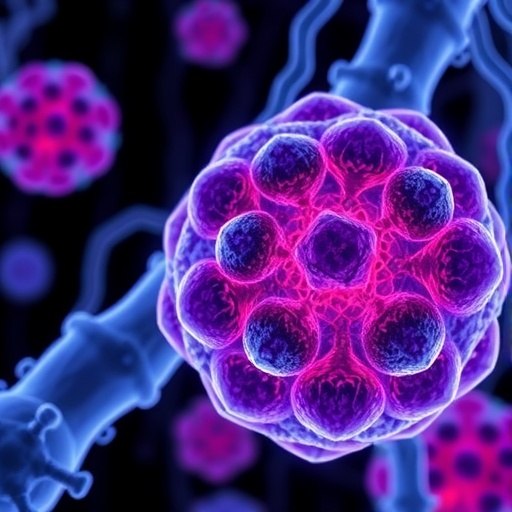In a groundbreaking advancement poised to reshape our understanding of cancer metabolism, scientists at The University of Osaka have unveiled novel insights into the elusive mechanisms behind the Warburg effect — the characteristic metabolic anomaly in cancer cells. Published in the prestigious journal Metabolic Engineering, this research elegantly marries experimental techniques with computational modeling to decode the preferential use of inefficient aerobic glycolysis by cancer cells, even in oxygen-rich environments. Their findings not only deepen our comprehension of cancer’s metabolic reprogramming but also open new avenues for targeted therapy.
Cancer cells are notorious for their voracious appetite for glucose, deviating sharply from normal cells by metabolizing glucose in a manner that yields far less energy per molecule. This metabolic quirk, first noted by Otto Warburg in the early 20th century, has perplexed scientists for decades. Why would rapidly proliferating cells adopt a less efficient energy-generation pathway like aerobic glycolysis, when oxidative phosphorylation — the process that yields far more ATP — remains available? The answer has remained one of cancer biology’s most compelling mysteries, demanding sophisticated investigative approaches to untangle.
The research team approached this quandary by integrating stable isotope tracing with ^13C-metabolic flux analysis and flux balance analysis—a computational technique that models the flow of metabolites through complex biochemical networks. By tracing the fate of ^13C-labeled glucose fed into cancer cells, they meticulously mapped metabolic pathways, quantifying how glucose metabolites traverse the cellular network. This data was then synthesized through a flux balance model to simulate metabolic flow, offering an unprecedentedly precise portrait of cancer metabolism in silico.
Their findings reveal a compelling thermodynamic rationale for the Warburg effect. Contrary to conventional wisdom that inefficient metabolism is merely a byproduct of malignancy, the study shows that aerobic glycolysis reduces metabolic heat output compared to oxidative phosphorylation. This reduction in metabolic thermogenesis may confer a survival advantage to cancer cells by mitigating detrimental heat accumulation, optimizing energy use within the tumor microenvironment, and potentially influencing cellular signaling pathways sensitive to thermal fluctuations.
The study meticulously demonstrates that cancer cells’ reliance on glycolysis is not a simple deficit but a carefully balanced metabolic adaptation. By siphoning energy through aerobic glycolysis, cancer cells may juggle energy production with the biosynthetic demands required for rapid proliferation. The flux analysis underscores that this metabolic redirection enables cancer cells to divert crucial glycolytic intermediates toward anabolic processes such as nucleotide, amino acid, and lipid synthesis—foundations for building new biomass—while keeping heat production in check.
Harnessing this integrative methodology, the researchers not only dissect the biochemical logic underpinning the Warburg effect but also provide a computational framework that can predict cancer-specific metabolic states. This tool can simulate how alterations in gene expression, enzyme activity, or nutrient availability may ripple through metabolic networks, affecting cancer cell survival and growth. Such predictive modeling is invaluable for designing therapeutic interventions that exploit metabolic vulnerabilities unique to cancer cells.
The interdisciplinary nature of this work, merging experimental biochemistry, systems biology, and information science, underscores the complexity of deciphering cancer metabolism. Lead author Dr. Nobuyuki Okahashi emphasizes that coupling metabolic flux analyses with computational simulations can unravel multilayered metabolic rewiring far more effectively than either approach alone. This integrated strategy reveals latent patterns and regulatory mechanisms that remain invisible using traditional experimental paradigms.
Importantly, the thermodynamic perspective introduced by this study challenges prevailing dogma and invites reconsideration of metabolic inefficiency in cancer as a strategic phenotype rather than a mere hallmark of dysfunction. By reducing heat generation, cancer cells might evade stress-induced damage and modulate their microenvironment to favor growth and immune evasion. These insights reposition metabolic thermogenesis as a critical factor in tumor biology and potentially, treatment resistance.
The implications for cancer therapy are profound. Targeting metabolic recalibrations that confer reduced thermogenesis and enhanced biosynthetic capacity could disrupt cancer cell homeostasis. Therapeutic agents designed to rebalance metabolic flux toward more energy-efficient but heat-generating pathways might sensitize tumors to heat stress or impair their biosynthetic machinery. This represents a paradigm shift where metabolic heat production and intracellular thermoregulation become therapeutic targets, alongside canonical oncogenic pathways.
Moreover, the study’s approach offers a blueprint for personalized medicine. Using patient-derived data to populate flux balance models could identify individual metabolic dependencies, guiding the selection of metabolic inhibitors tailored to disrupt specific tumor metabolic states. Such precision therapies would minimize off-target effects, sparing normal tissues while exploiting cancer-specific vulnerabilities illuminated by flux analyses.
The collaborative effort between Osaka and Kanazawa Universities exemplifies the power of interdisciplinary research in confronting the multifaceted challenges of cancer biology. By bridging biology, engineering, and computational science, these investigators have provided a robust platform for both fundamental discovery and translational application. Their work heralds a new era where metabolism-centric views drive innovation in cancer diagnosis, prognosis, and therapy.
This research underscores the vital importance of quantifying cellular metabolism with unprecedented granularity. As cancer metabolism continues to be recognized as a cornerstone of malignancy, integrating experimental isotopic tracing with computational systems biology will be critical to unlocking how aberrant metabolic states support tumor progression and resistance. The knowledge gleaned here lays groundwork that future studies will expand to encompass diverse cancer types and microenvironmental contexts.
In conclusion, the elucidation of cancer cells’ metabolic heat regulation coupled with their glycolytic predilection provides a fresh lens through which to view tumor biology. This study’s synthesis of metabolic flux analysis and computational modeling not only clarifies a longstanding cancer paradox but also opens promising therapeutic vistas. By understanding and ultimately manipulating cancer metabolism’s thermodynamic balance, we edge closer to more effective, less toxic cancer treatments that exploit the unique physiologic quirks of cancer cells themselves.
Subject of Research: Cells
Article Title: Metabolic flux and flux balance analyses indicate the relevance of metabolic thermogenesis and aerobic glycolysis in cancer cells
News Publication Date: 20-Aug-2025
References: DOI: 10.1016/j.ymben.2025.08.002
Image Credits: Nobuyuki Okahashi
Keywords: Life sciences; Diseases and disorders; Cancer; Cancer metabolomics; Biotechnology; Information technology; Drug discovery




